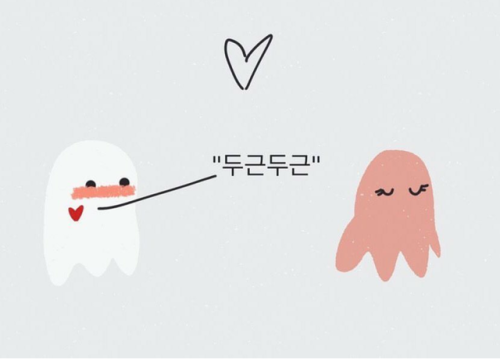
안녕!! 엘입니다! hi, i'm el!! · korean studyblr · not fluent ・ japanese studyblr @mxnojun
118 posts
- Korean Onomatopoeia

꿀꿀 한국어 의성어 - Korean Onomatopoeia 🗯
on·o·mat·o·poe·ia
/ˌänəˌmadəˈpēə,ˌänəˌmädəˈpēə/
noun
the formation of a word from a sound associated with what is named (e.g., cuckoo, sizzle ). the use of onomatopoeia for rhetorical effect
Here I am back with Korean Onomatopoeiae. To summarize the definition, it’s a word given to what a sound makes (for lack of better words) Enjoy <3
음 - uhm
아야 - ouch!
쪽 - smooch/kiss
두근두근 - throbbing heart
앗 - oops! / oh no!
냠냠 - chewing sound
짝짝짝- clapping
엉엉 - crying
멍멍 - dog’s bark
꽥꽥- duck quack
야옹 - cat’s meow
꿀꿀 - pig’s oink
찍찍 - mouse squeaking
따르릉 - telephone ringing
똑똑 - knocking ( 너는 똑똑해요 - you’re smart!)
개굴개굴 - croak of a frog
음메 - cow mooing
칙칙폭폭 - toot of a train
쾅 - something banging/falling on the floor
I hope you enjoyed this lesson! Have a great day ~
-
 xsolar-ghost reblogged this · 7 months ago
xsolar-ghost reblogged this · 7 months ago -
 harvnote liked this · 1 year ago
harvnote liked this · 1 year ago -
 peachcheekss reblogged this · 1 year ago
peachcheekss reblogged this · 1 year ago -
 peachcheekss liked this · 1 year ago
peachcheekss liked this · 1 year ago -
 burnblaze204 liked this · 1 year ago
burnblaze204 liked this · 1 year ago -
 wafflesandcoffee reblogged this · 1 year ago
wafflesandcoffee reblogged this · 1 year ago -
 elkoreanmmichi reblogged this · 1 year ago
elkoreanmmichi reblogged this · 1 year ago -
 cottagecatt15 liked this · 1 year ago
cottagecatt15 liked this · 1 year ago -
 moontechnologic liked this · 2 years ago
moontechnologic liked this · 2 years ago -
 nonexistant-sunshine liked this · 3 years ago
nonexistant-sunshine liked this · 3 years ago -
 h-atoon reblogged this · 3 years ago
h-atoon reblogged this · 3 years ago -
 a-little-bit-of-lots-of-stuff liked this · 3 years ago
a-little-bit-of-lots-of-stuff liked this · 3 years ago -
 toothfairycrimes liked this · 3 years ago
toothfairycrimes liked this · 3 years ago -
 mariusvonhangme liked this · 3 years ago
mariusvonhangme liked this · 3 years ago -
 studyere liked this · 3 years ago
studyere liked this · 3 years ago -
 lunloo liked this · 3 years ago
lunloo liked this · 3 years ago -
 letsbenkyousuru reblogged this · 3 years ago
letsbenkyousuru reblogged this · 3 years ago -
 dearvryu liked this · 3 years ago
dearvryu liked this · 3 years ago -
 hikmat-studies-kr liked this · 3 years ago
hikmat-studies-kr liked this · 3 years ago -
 n4h0m1 liked this · 3 years ago
n4h0m1 liked this · 3 years ago -
 gay-soriya reblogged this · 3 years ago
gay-soriya reblogged this · 3 years ago -
 songofabard liked this · 3 years ago
songofabard liked this · 3 years ago -
 ariuka-munkh liked this · 3 years ago
ariuka-munkh liked this · 3 years ago -
 adorayla reblogged this · 3 years ago
adorayla reblogged this · 3 years ago -
 sadlilyoshi liked this · 3 years ago
sadlilyoshi liked this · 3 years ago -
 luna1 liked this · 3 years ago
luna1 liked this · 3 years ago -
 pandemoniums-blog liked this · 3 years ago
pandemoniums-blog liked this · 3 years ago -
 mentoniiaa liked this · 3 years ago
mentoniiaa liked this · 3 years ago -
 freshbeginnings02 reblogged this · 3 years ago
freshbeginnings02 reblogged this · 3 years ago -
 freshbeginnings02 liked this · 3 years ago
freshbeginnings02 liked this · 3 years ago -
 snailwasps liked this · 3 years ago
snailwasps liked this · 3 years ago -
 oreofrappiewithblueberry liked this · 3 years ago
oreofrappiewithblueberry liked this · 3 years ago -
 bug-ouo liked this · 3 years ago
bug-ouo liked this · 3 years ago -
 lovemesomepieeee liked this · 3 years ago
lovemesomepieeee liked this · 3 years ago -
 nana0o liked this · 3 years ago
nana0o liked this · 3 years ago -
 elisa0508 liked this · 3 years ago
elisa0508 liked this · 3 years ago -
 sk-emi liked this · 3 years ago
sk-emi liked this · 3 years ago -
 goyangi-studies reblogged this · 3 years ago
goyangi-studies reblogged this · 3 years ago -
 webecah liked this · 3 years ago
webecah liked this · 3 years ago -
 icanstayeah reblogged this · 3 years ago
icanstayeah reblogged this · 3 years ago -
 icanstayeah liked this · 3 years ago
icanstayeah liked this · 3 years ago -
 seoulja94 liked this · 3 years ago
seoulja94 liked this · 3 years ago -
 jadedragon27091 reblogged this · 3 years ago
jadedragon27091 reblogged this · 3 years ago
More Posts from Mxnojoon
Is ㄹ pronounced as L or R?
This is probably one of the most common questions that beginners ask when learning 한글. Just like every beginner learners, I went through this as well which is why I decided to study pronunciation rules too. I created this post to help clear up any confusion.
When ㄹ is located at the beginning of a word, it sounds more like an R.
Example: 라디오 (ra-di-o), 레슨 (re-seun), 로맨틱 (ro-man-tik)
When ㄹ is located between two vowels, it sounds like an R.
Example: 다리 (da-ri), 사랑 (sa-rang), 어렵다 (eo-ryeob-dda), 모르다 (mo-reu-da), 노력 (no-ryeok), 매력 (mae-ryeok)
When ㄹ is located at the end of a word, it’s pronounced more like an L.
Example: 딸 (ddal), 아들 (a-deul), 월 (weol), 달 (dal), 칼 (khal), 연필 (yeon-pil), 교실 (gyo-sil)
When ㄹ is followed by a consonant or followed by another ㄹ, it sounds like L.
Example: 딸기 (ddal-gi), 힘들다 (him-deul-da), 몰라 (mol-la), 살자 (sal-ja), 고릴라 (go-ril-la)
When ㄹ comes after any consonant except ㄴ, ㄹ is pronounced as N.
Example: 생리 (saeng-ni), 국립 (gung-nip), 능력 (neung-nyeok)
When ㄹ comes before or after an ㄴ, both ㄹ and ㄴ are pronounced as ㄹ.
Example: 한류 (hal-lyu), 신라 (sil-la), 신랑 (sil-lang), 달나라 (dal-la-ra)
Disclaimer: Hope this helps but remember not to rely too much on romanizations and listen to the sounds properly as well.
This is a post that I shared on Amino app and I decided to post it here as well.
List of adjectives in ~스럽다
These are the most common I’ve found on Twitter. This list is by no means exhaustive.
사랑스럽다 : lovely
자랑스럽다 : proud
자연스럽다 : natural
실망스럽다 : disappointing
만족스럽다 satisfactory
송구스럽다 : sorry, apologectic
급작스럽다 : abrupt, sudden
촌스럽다 : to be out of style
수다스럽다 : talkative
뻔뻔스럽다 : shameless
바보스럽다 : foolish, stupid
변덕스럽다 : unpredictable, fickle, temperamental
부담스럽다 : burdensome
혼란스럽다 : confusing
탐스럽다 : desirable, attractive
유감스럽다 : unfortunate
퉁명스럽다 : abrupt, brusque
조심스럽디 : careful, cautious
안쓰럽다 : to feel sorry (for)
당황스럽다 : embarrassed, disconcerted
겸연스럽다 : embarrassed, sheepish
혐오스럽다 : disgusting, detestable
후회스럽다 : regretful, remorseful
여성스럽다 : feminine, girly
남성스럽다 : masculine
무지스럽다 : ignorant, dull
의심스럽다 : doubtful, suspicious
쑥스럽다 : shy, bashful
어른스럽다 : mature, adult-like
믿음직스럽다 : reliable, worthy
존경스럽다 : admirable
감동스럽다 : touching, moving
먹음직스럽다 : appetizing
개탄스럽다 : deplorable, lamentable
감격스럽다 : impressed, touched
망령스럽다 : childish, foolish
수치스럽다 : shameful, disgraceful
공포스럽다 : frightening, scary
별스럽다 : odd
죄스럽다 : feeling guilty

Some Hangul notes I made for my friend, I don’t need them because I’m way past learning it but if you’re a beginner then feel free to take a look at it 🥺🧡
Friendly reminder that Duolingo cannot teach you a language, but it is good practice for vocabulary being seen in context and goes well with additional resources like a textbook!
*:・°✧ how to introduce yourself in korean°
1. 이름이 뭐예요? whats your name? - 제 이름은 name이에요/예요 or 저는 name이에요/예요
~이에요 if ur name ends with a consonnant ~예요 if it ends with a vowel
♡
2. 어디에서 왔어요? where are you from? - country 사람이에요
examples : 프랑스 사람이에요 ; i am french 프랑스 ; france 사람 ; person
중국 사람이에요 ; i am chinese etc..
♡
3. 몇살이에요? how old are you? - age살이에요
examples : 17살이에요 ; i’m 17 years old 24살이에요, 14살이에요…
♡
4. 취미가 뭐예요? what are ur hobbies? - 노래하는 것을 좋아해요 i like singing
verb+는 것을 좋아해요
요리하는 것을 좋아해요 ; i like cooking 읽는 것을 좋아해요 ; i like reading 춤 추는 것을 좋아해요 ; i like dancing
♡
5. 학생+이에요 ; i am a student 고등학생 ; high schooler 대학생이에요 ; university student
OR
occupation이에요/예요 의사예요 ; im a doctor 선생이에요 ; im a teacher
♡
6. language를 공부해요 i study…. 프랑스어를 공부해요 ; i study french 영어를 공부해요 ; i study english
language를 배우고 있어요 i am learning…. 한국어를 배우고 있어요 ; i am learning korean 일본어를 배우고 있어요 ; i am learning japanese
♡ study well 💪💕🙋